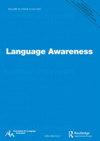第三人称单数代词they在学术写作中的使用:来自菲律宾大学英语教师的视角
IF 2.2
2区 文学
0 LANGUAGE & LINGUISTICS
引用次数: 0
摘要
摘要近几十年来,性别公平语言在教育领域引起了相当大的关注。英语教学领域也同样促进了这一发展,性别问题受到了极大的关注。当前的研究通过调查英语教学从业者在学术写作中使用第三人称单数代词they的观点,增加了这一不断发展的对话。这一领域在关于英语教学中性别多样性的文献中很少受到关注,特别是在菲律宾等限制和保守的社会。通过对来自菲律宾大学的64位英语教师的调查,其中15位参加了后续的电子邮件访谈,该研究探讨了这些教师对在英语中使用单数they的看法。该研究还考察了这些教师在其AW教学实践中使用单数they的方式。调查结果表明,教师对在英语教学中使用单数they持积极态度,事实上,他们认为这对促进性别包容和平等是必要的。然而,一些教师也报告说,他们自己的传统、保守的知识和信仰,以及利益相关者可能的抵制,是在将单数they作为GFL实践的组成部分整合到AW时需要面对的挑战。摘要(菲律宾)“性别公平语言”(gender-fair language, GFL)是一种“性别公平语言”(gender-fair language, GFL)。Nakapag-ambag在英语语言教学(ELT)的发展中发挥着重要的作用,在英语教学(ELT)中发挥着重要的作用。Ang kasalukuyang pag-aaral ay paglahok sa nabanggit na yumayabong na talastasan, sa pamamagitan ng pagsiyasat sa perspektiba ng mga praktisyoner ng ELT . paggamit ng panghalip pang-isahan na nasa ikatlong panauhan na他们说akademikong pagsulat '学术写作' (AW)。Batay将“性别多样性”定义为“性别多样性”,kakaunti pa ang nagsagawa ng pag-aaral sa erya na ito,特别是在konserbatibong lipunan和菲律宾语中定义为“性别多样性”。在菲律宾,菲律宾人在菲律宾,菲律宾人在菲律宾,菲律宾人在菲律宾,菲律宾人在菲律宾,菲律宾人在菲律宾,菲律宾人在菲律宾,菲律宾人在菲律宾,菲律宾人在菲律宾,菲律宾人在菲律宾,菲律宾人在菲律宾,菲律宾人在菲律宾,菲律宾人在菲律宾,菲律宾人在菲律宾。Sinusuri din sa pag-aaral ang pamamaraan和mga guro sa kung paano isinasama sa pagtuturo和awang paggamit - pag- ishang他们。Natuklasan sa pag-aaral na mayroong positibong pananaw ang mga guro sa paggamit ng pang-isahang他们说AW at, sa katunayan, nakita nila ang pangangailangan nito sa pagsusulong是“性别包容”,是“平等”。' Gayunman, ilan sa mga guro ay ibinahagi in ang kanilang saring传统,konserbatibong kaalaman at mga paniniwala,在任何可能的抵抗者中,mula sa mga利益相关者bilang hamon na kailangan harapin kapag isama ang pangi - ishang他们说AW bilang bahagi ng praktika ng GFL。在过去的几十年里,性别公平语言(GFL)引起了学校的兴趣,关于性别公平语言的使用问题在英语教学中得到了强调。本研究调查了英语教学教师在学术写作(AW)中使用第三人称单数代词的观点,这一领域在文献中很少受到关注,特别是在菲律宾等保守国家。目前的研究特别关注这些教师对在AW中使用单数they的看法,以及他们如何将其纳入AW教学实践。研究结果表明,教师倾向于在英语教学中使用单数they,以促进性别平等和包容性。然而,当将单数they作为GFL实践的一部分引入AW时,一些教师认为他们自己保守的知识和价值观以及利益相关者的抵制是障碍。关键词:英语教学性别教育性别公平语言性别与发展披露声明作者未报告潜在的利益冲突。这篇文章已经获得了开放材料的开放科学中心徽章,这些材料可以在https://www.iris-database.org/details/qa1EN-ecrHv上公开获取本文章由计算机程序翻译,如有差异,请以英文原文为准。
Using the third-person singular pronoun they in academic writing: perspectives from English language teachers in Philippine universities
AbstractIn recent decades, gender-fair language (GFL) has drawn considerable attention in educational settings. The field of English language teaching (ELT) likewise has contributed to this development, with gender issues receiving significant focus. The current study adds to this evolving conversation by investigating ELT practitioners’ perspectives on using the third-person singular pronoun they in academic writing (AW). This area has received little attention in the literature on gender diversity in ELT, particularly in restrictive and conservative societies such as the Philippines. Using a survey with 64 English language teachers from Philippine universities, 15 of whom participated in follow-up email interviews, the study explores what these teachers think about using singular they in AW. The study likewise examines the ways these teachers include the use of singular they in their AW teaching practice. The findings demonstrate that the teachers have positive views on using singular they in AW and, in fact, find it necessary for promoting gender inclusivity and equality. However, some teachers also report their own traditional, conservative knowledge and beliefs, and possible resistance from stakeholders as challenges that need to be faced when integrating singular they in AW as a component of GFL practice.ABSTRACT (FILIPINO)Sa nakalipas na mga dekada, ang ‘gender-fair language’ (GFL) ay nakakuha ng malaking atensyon sa mga espasyo ng pagtuturo. Nakapag-ambag din sa debelopment nito ang larang ng pagtuturo ng wikang Ingles o English language teaching (ELT), kung saan karamihan ay nagtuon sa isyu ng kasarian. Ang kasalukuyang pag-aaral ay paglahok sa nabanggit na yumayabong na talastasan, sa pamamagitan ng pagsiyasat sa perspektiba ng mga praktisyoner ng ELT sa paggamit ng panghalip pang-isahan na nasa ikatlong panauhan na they sa akademikong pagsulat o ‘academic writing’ (AW). Batay sa mga literatura hinggil sa ‘gender diversity’ sa ELT, kakaunti pa ang nagsagawa ng pag-aaral sa erya na ito, partikular na sa mga mahihigpit at konserbatibong lipunan tulad ng Pilipinas. Sa pagsasagawa ng sarbey sa 64 na guro ng wikang Ingles mula sa mga unibersidad sa Pilipinas, kung saan 15 sa kanila ay lumahok sa follow-up na interbyu sa email, sinisiyasat ng pag-aaral kung ano ang pagtingin ng mga guro sa paggamit ng pang-isahang they sa AW. Sinusuri din sa pag-aaral ang pamamaraan ng mga guro sa kung paano isinasama sa pagtuturo ng AW ang paggamit ng pang-isahang they. Natuklasan sa pag-aaral na mayroong positibong pananaw ang mga guro sa paggamit ng pang-isahang they sa AW at, sa katunayan, nakita nila ang pangangailangan nito sa pagsusulong ng ‘gender inclusivity’ at ‘equality.’ Gayunman, ilan sa mga guro ay ibinahagi rin ang kanilang sariling tradisyonal, konserbatibong kaalaman at mga paniniwala, at ang posibilidad ng resistans mula sa mga stakeholder bilang hamon na kailangan harapin kapag isinama ang pang-isahang they sa AW bilang bahagi ng praktika ng GFL.PLAIN LANGUAGE SUMMARYGender-fair language (GFL) has sparked interest in schools during the last few decades, and issues concerning the use of GFL have been emphasized in English language teaching (ELT). This study investigates ELT teachers’ perspectives on utilizing the third-person singular pronoun they in academic writing (AW), an area in the literature that has received little attention, particularly in conservative countries such as the Philippines. The current study looks specifically at what these teachers believe about using singular they in AW and how they incorporate it into their AW teaching practice. The findings indicate that the teachers favor the use of singular they in AW to promote gender equality and inclusivity. When introducing singular they in AW as part of GFL practice, however, some teachers identify their own conservative knowledge and values, as well as stakeholder resistance, as barriers.Keywords: English language teachinggender educationgender-fair languagegender and development Disclosure statementNo potential conflict of interest was reported by the author(s).Open ScholarshipThis article has earned the Center for Open Science badges for Open Materials The materials are openly accessible at https://www.iris-database.org/details/qa1EN-ecrHv
求助全文
通过发布文献求助,成功后即可免费获取论文全文。
去求助
来源期刊

Language Awareness
Multiple-
CiteScore
3.70
自引率
10.00%
发文量
18
期刊介绍:
Language Awareness encourages and disseminates work which explores the following: the role of explicit knowledge about language in the process of language learning; the role that such explicit knowledge about language plays in language teaching and how such knowledge can best be mediated by teachers; the role of explicit knowledge about language in language use: e.g. sensitivity to bias in language, manipulative aspects of language, literary use of language. It is also a goal of Language Awareness to encourage the establishment of bridges between the language sciences and other disciplines within or outside educational contexts.
 求助内容:
求助内容: 应助结果提醒方式:
应助结果提醒方式:


